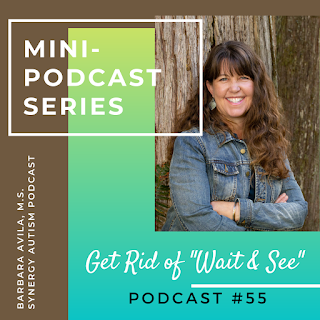Episode #55: MP - Get rid of "wait and see"
I used to think the “wait and see” approach only affected little ones before the age of 2 or 3. Parents bringing their children in with concerns about social engagement and medical professionals stating that the child is still within normal limits so let’s “wait & see.” The hope being that the child would outgrow the lack of engagement, not yet saying words, or having what seemed like extreme reactions to sensory information.
I did think it was tragic that children were then hitting preschools and kindergarten with pretty significant delays and undue stress that may have been alleviated by being served earlier with appropriate interventions. However, the longer I have now been in the field., the more I see the long term effects of the “wait and see” approach. The hesitancy to diagnose autism affects teens and adults later and we really need to be attending to those downstream issues we are causing.
I currently have two young adults and one teen whose parents engaged teachers, counselors and medical personnel at different points along their child’s development. Reviewing their records, you can see the trail of comments from very savvy and caring professionals documenting sensory sensitivities, anxiety and social challenges but NOT mentioning autism. These young people were and are so good at complying, making eye contact and just making it in conversation (AKA masking by the way) that autism is dismissed rather than mentioned. The result is that they either manage to graduate high school or drop out due to severe sensory overload, bullying or not finding it meaningful. They then do not have the flexibility , decision making skills, or social confidence to work or go to college or live on their own. We are doing a huge disservice to so many children and families with this wait and see approach. I think we need to figure out at least mentioning autism earlier as a possibility - as a preliminary diagnosis or simply a referral to appropriate resources for the parents.
I imagine a world where the word “autism” is not such a scary word. We currently end up avoiding it as professionals. I believe we can get to a place where we can recognize it as a neurodiversity with a potential for serious sensory and social challenges. We can then address it accordingly - not as a disease to be cured but as a difference in processing needing sensory and social guidance and support. Children who are showing early signs of delays in social engagement can and should receive family education and support. In my experience, most parents want more information and stand ready to alleviate sensory overload. With information they can increase manageable social practice regardless of age.
I have now met too many adolescents in the juvenile corrections system and adults in the adult corrections system who could have had appropriate guidance early and have reduced their feeling ostracized, bullied, and needing to turn to drugs, alcohol, or joining the wrong crowds either by choice or by association - those who do not understand them assume they are manipulative versus experiencing sensory stress behavior and they are placed in education and treatment facilities that are not well suited to them. Trauma informed care may very well be an excellent direction for some autistic individuals but coupled with visual and concrete modifications.
If someone feels that their child may have symptoms of autism at any age - do not wait for diagnosis for that is just a label. Take the reins and give support and practice consistent with and common for autism interventions. You cannot hurt your child by providing sensory support and social practice. Good autism interventions are actually good for all children. It will help regardless of diagnosis. And if you are a professional in the field… Share your concerns early not to label but to help loved ones learn, understand and support as soon as parents are asking and when you notice concerns or differences.
Please note, as many of you may already know but I need to state - I am not talking about getting a child in ABA early. I am actually not a fan of what a strictly behavioral lens can do to a person and it frankly does not make a lot of sense to me with the core issues being social engagement related. I’m talking about decreasing the sensory overload a child is experiencing as well as giving practice in early fundamental and foundational social engagement.
For more information, my book just might be the help you are looking for. My book is titled “Seeing Autism - Connection through Understanding” and is due out July 15, 2021.
Till next time….




Comments
Post a Comment